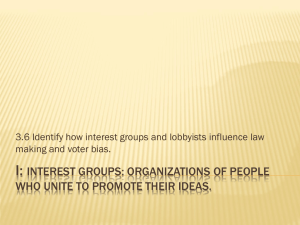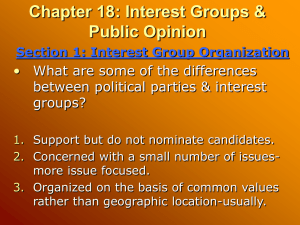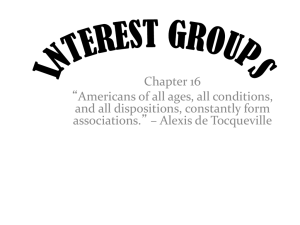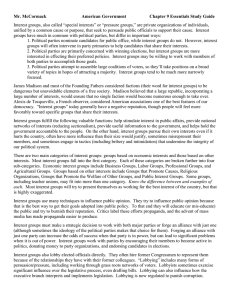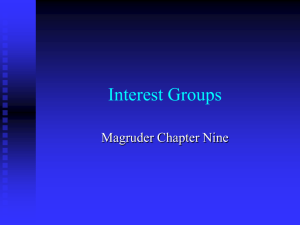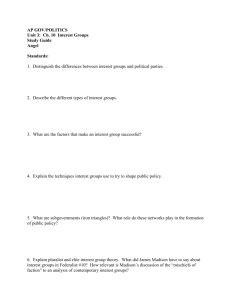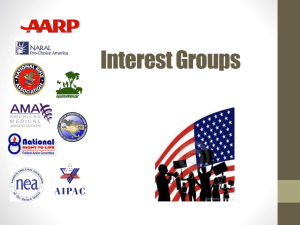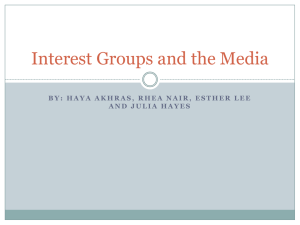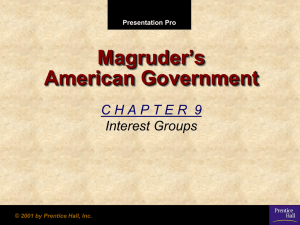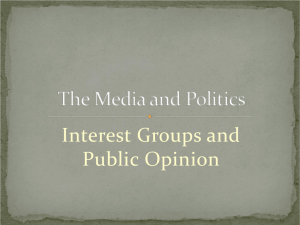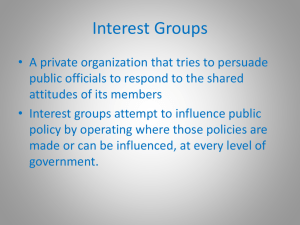Interest groups and private organizations work to shape public policy
advertisement
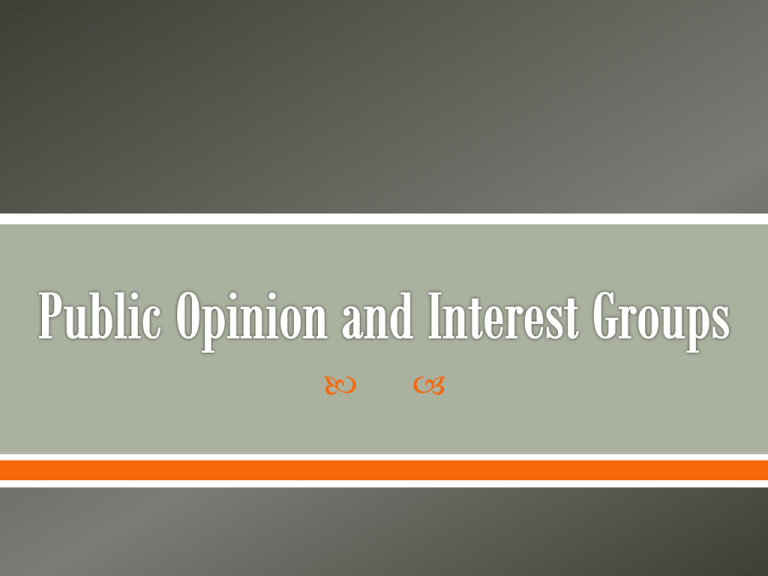
Government leaders make policy based on public opinion. o Measured by elections, interest groups, the media and personal contacts. • Public opinion polls: devices that collect information through questioning. • More accurate polls are based on scientific techniques. Interest groups and private organizations work to shape public policy. o Often present their views as public opinion, actually how many they represent is unknown. o Pubic officials can use the media and public contacts to gain some sense of public opinion. Scientific polling: Most accurate and complex o Five steps 1. Choose the population the poll aims to measure. 2. Constructing a Sample: representative slice of the population. • Random sample: you have an equal chance to be picked. • Quota sample: one that deliberately picks a certain of people of a given population with certain characteristics. 3. Preparing Valid Questions 4. Interviewing 5. Analyze and Report Findings Plays a huge part in setting public agenda. o (public issues that people think and talk about) The media plays central role in elections. o Example: TV has reduced the importance of political parties, candidates rely on party less because TV allows candidates to reach public directly. Political Parties work hard to get good media. o The Influence is limited some because few people follow political issues carefully in the media. Those who do follow choose their favorite sources rather than sources with contrary opinions to their own. Interest groups exist to shape public policy. Public policy includes all of the goals a government sets and the action it takes to meet them. • Work at the federal, state, and local levels Interest groups reach out to the public for these reasons: 1. 2. 3. To supply information in support of the group’s interests To build a positive image for the group To promote a particular public policy To achieve their goals, often use propaganda o o o Belief may be true or false. It presents only one side of an issue. Often relies on name-calling and inflammatory labels. Political parties and interest groups differ in 3 ways: Making of Nominations 1. o o 2. Political parties are responsible for the nominating process Interest groups hope to influence those nominations. In their Primary Focus o o 3. Political parties are interested in winning elections and controlling government Interest groups are interested in influencing the policies created by government. The Scope of Interest o o Political parties concern themselves with the whole range of public affairs Interest groups tend to focus on issues that their members are concerned about. Raise awareness of public affairs, or issues that concern the people at large. Represent people who share attitudes Provide useful information to government Are vehicles for political participation. Keep tabs on various public agencies and officials. Have more influence then they deserve based on their size or importance. It can be difficult to tell who or how many people the group represents. Groups do not always represent the views of the people they claim to speak for. In rare cases, groups use tactics such as bribery, threats, and so on. Most interest groups represent economic interest - especially business, labor, agricultural, and professional interests. A public-interest group: work for the “public good” - they try to represent all the people, whether or not they belong to that organization. Purpose Example To promote business American Bankers Association To organize labor Fraternal Order of Police To protect agricultural interests National Farmers Union To promote professionalism American Medical Association To promote social programs Veterans of Foreign Wars For religious purposes American Jewish Congress For the public good League of Women Voters Chapter 9, Section 2 Political Action Committees (PACs) raise and distribute money to candidates who will further their goals. Single –interest groups are PACs that concentrate their efforts on one issue. o They work for or against a political candidate based only on his or her stand on that one issue. Lobbyists: someone who is employed to persuade legislators to vote for legislation that favors the lobbyist's employer Lobbyists use several techniques: They send articles, reports, and other information to officeholders. They testify before legislative committees. They bring “grass-roots” pressures to bear through email, letters, or phone calls from constituents. They rate candidates and publicize the ratings. They make campaign contributions. Example: “Thank You For Smoking” http://www.youtube.com/watch?v=iBE LC_vxqhI Lobbying: bringing group pressure to bear on all aspects of the making of public policy. http://www.youtube.com/watch ?v=xdh_m5lQUUY&feature=rela ted Lobbying carries beyond the legislature. It is brought into government agencies, the executive branch, and even the courts. Nearly all important organized interest groups maintain lobbyists in Washington, D.C. http://www.youtube.com/watch?v=R2 DUM6jVasw&feature=related
